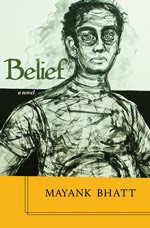Both the books have better production quality that books published by mainstream publishers, and should ideally been included in their oeuvre.
Friday, November 11, 2011
Isabelle of Bombay - A Cosmic Conflict
Every immigrant hopes to someday return home.
She lives in the hope that when everything is over and done
with, she’ll return to her roots, even if there’s nothing left to return to.
Her past belongs to a miasma of imagination and is addled mixture
of regrets and nostalgia.
Her future is a lost in hope – hope to somehow return to her
world that actually never was.
And her present is lost between an implausible past and an impossible
future.
As I read Isabelle of Bombay, I couldn’t help thinking about
this quintessential immigrants’ dilemma.
Colleen Ansley’s first novel captures this dilemma
eloquently.
Isabelle leaves her Bombay and comes to Canada
(Ottawa-Montreal and finally Toronto), but her struggles continue; her life changes and its
gets worse -- much worse before it gets better.
Perhaps the true reason why Isabelle finally succeeds is the 'Keep Calm & Carry On' spirit that is essential to Bombay and Toronto.
Ansley is able to capture the true character of both the
cities in the novel.
The book is peppered with innumerable such examples.
She illustrates Toronto’s culture of tolerance by a remarkable
anecdote.
Isabelle’s colleague Harry narrates an incident to
illustrate to her to teach her to stand firm for her rights.
“As Vice Principle of a school, I attended the annual
teacher’s conference. At one session, participants stood up to give their view
on a particular issue. I stood up and gave my opinion too. My Scottish accent
was much stronger at that time. I had barely finished speaking when someone in
the crowd stood up and questioned me.
“Hey! You there with a Scottish accent. Aren’t you a
Displaced Person?”
“Before I could think of an answer,” Harry continues, “Another
person in the crowd stood up and inquired of that man.”
“And may I ask your name sir?”
“Oliver Greenhill,” the man responded.
“Well Oliver, you certainly are not from here either. You
don’t have an aboriginal name.”
“People in the crowd stood up and cheered. That was the day
I realised how many others were in the same situation as me. Since then, I
decided I was going to stand my ground and not flee again. Don’t let anyone
step on your toes Isabelle. Speak up. Everyone here has come as an immigrant.
You have a right to this country just like everyone else.”
She reveals and Bombay’s vibrant multi-religious,
multi-ethnic composition with an evocative example of multi-faith healing.
When a friend of the family –
Bernard – is taken ill and in addition to the doctor, holy men from different
faiths come and administer their special panaceas – and Bernard is miraculously
cured.
“Whose God cured Bernard? In each case, prayers were said to
a God with a different name. When it came to saving a person’s life, religious
barriers were easily discarded.”
The cosmic conflict between Kali and St. Brigid is in reality a friendly contest to protect
Isabelle from both real and perceived threats.
This is the second self-published book I’ve read in the last
month. Just Matata by Braz Menezes.
Both the books have better production quality that books published by mainstream publishers, and should ideally been included in their oeuvre.
Both the books have better production quality that books published by mainstream publishers, and should ideally been included in their oeuvre.
Subscribe to:
Post Comments (Atom)





No comments:
Post a Comment